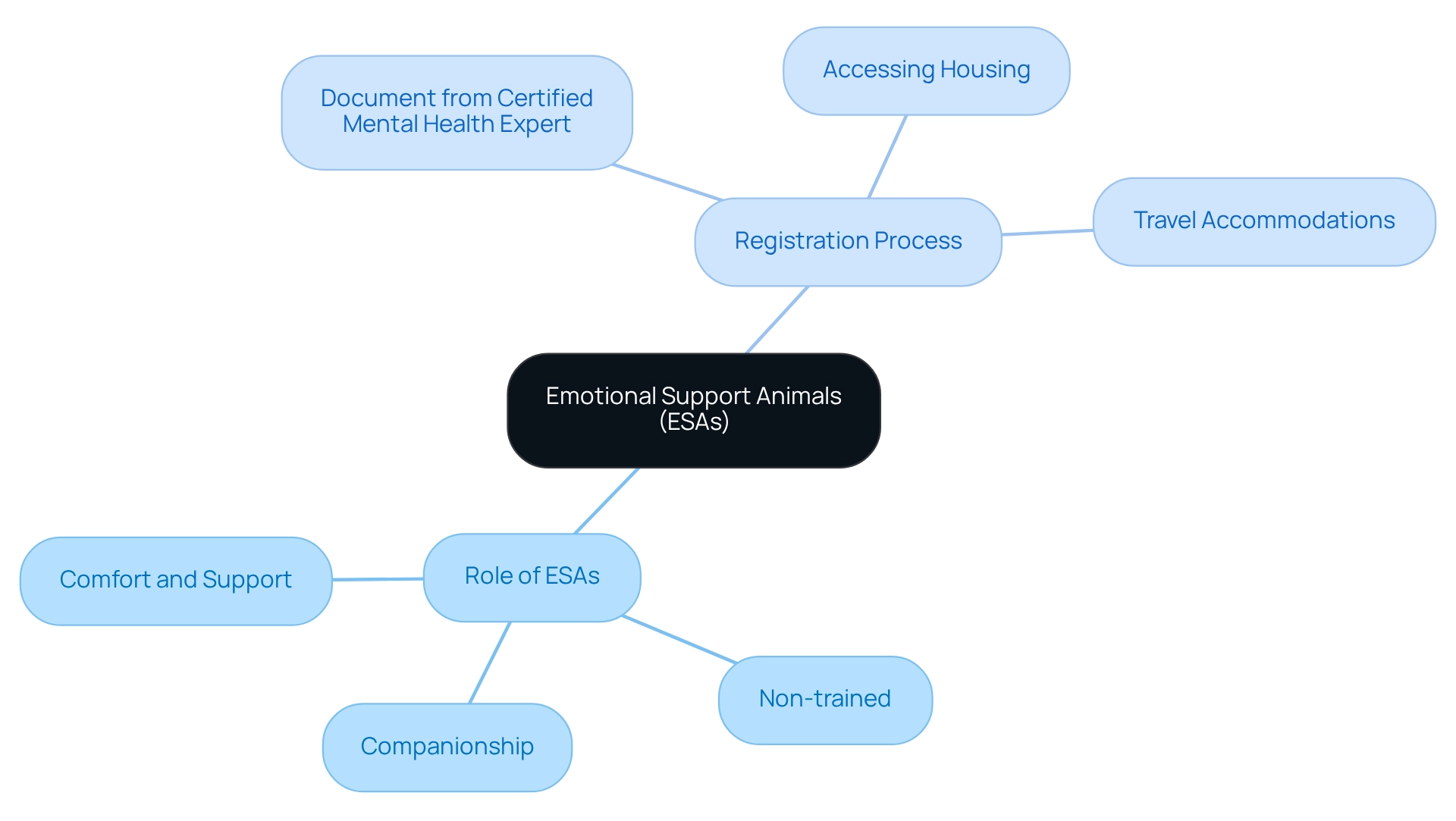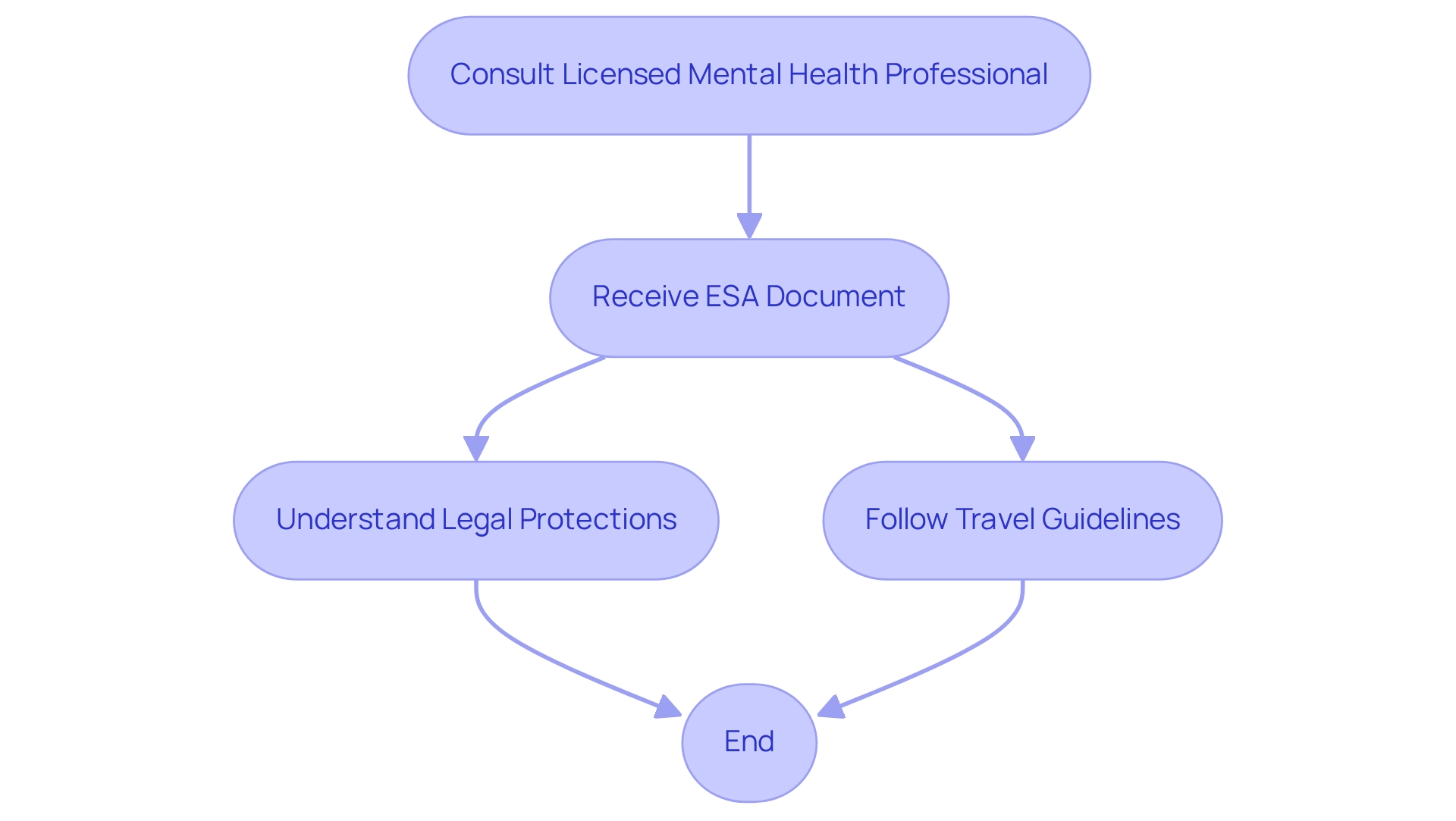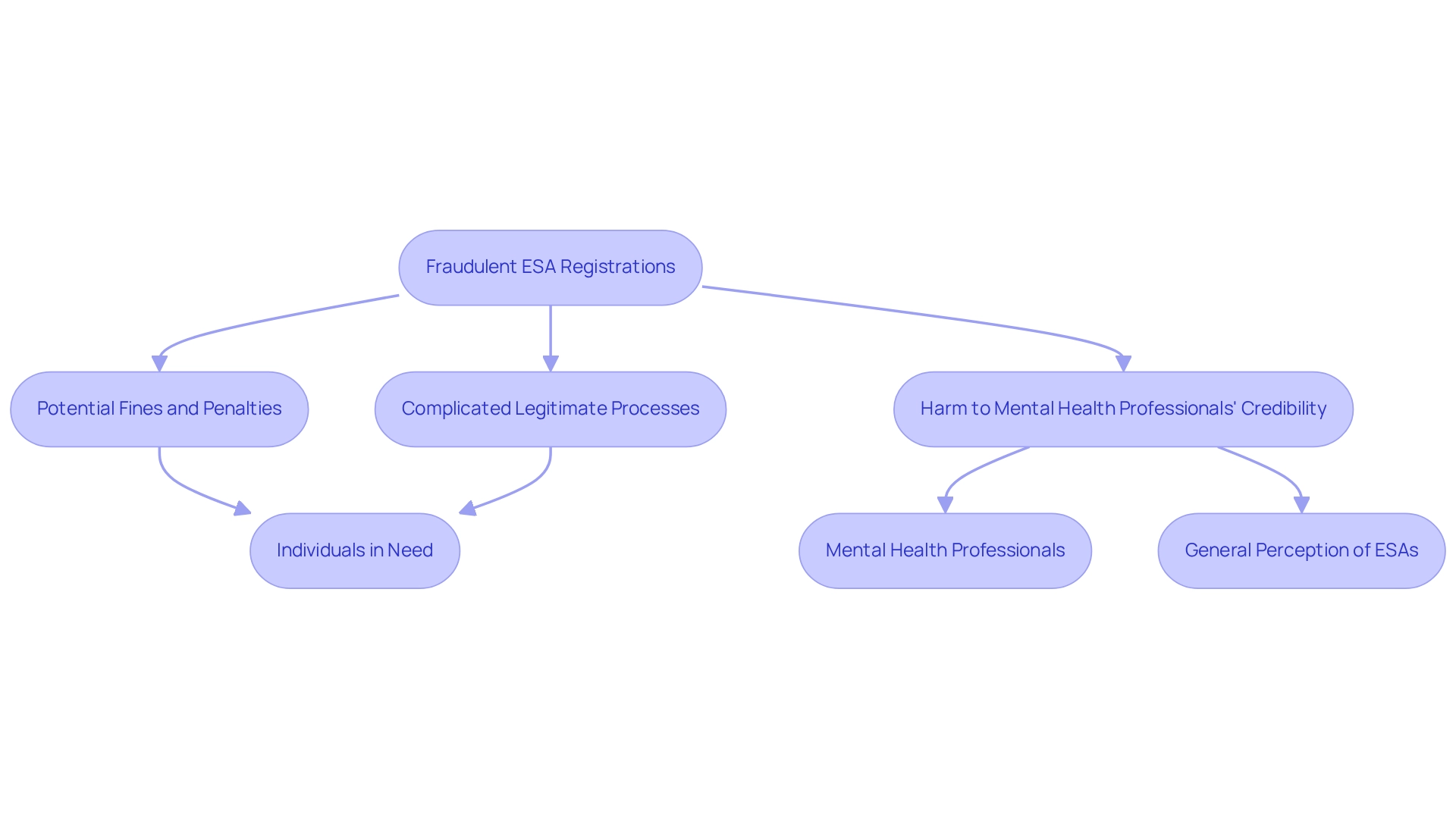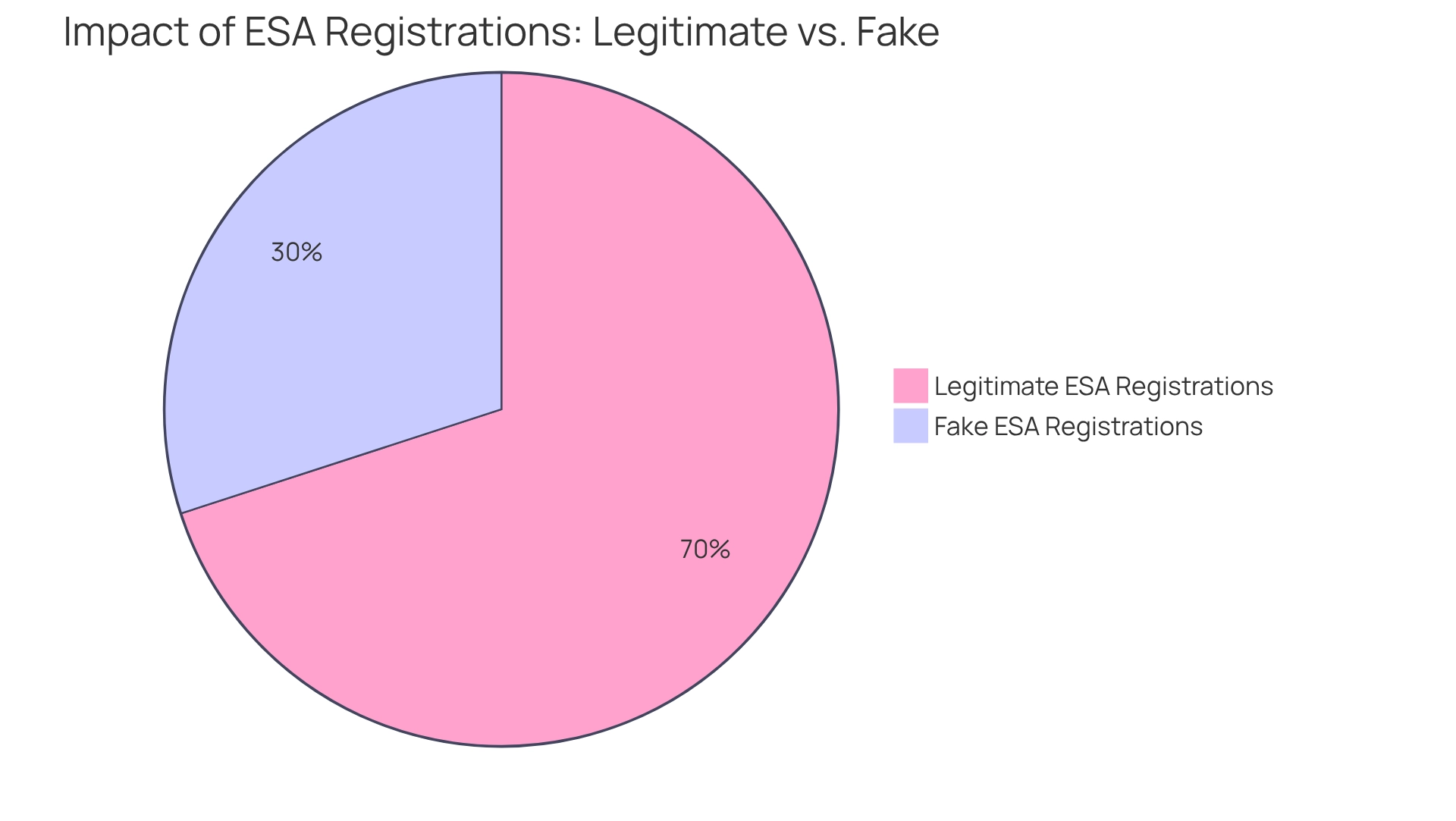

Legitimate Emotional Support Animal Registration: Key Differences Explained
by Lena Park
Last updated: May 6, 2025
Verified and Approved by:
Angela Morris,
MSW, LCSW
Fact Checked

Overview
This article highlights the crucial differences between legitimate emotional support animal (ESA) registrations and those that are fraudulent.
Many individuals face significant emotional challenges, and it’s essential to understand that legitimate registrations come from a formal assessment by a licensed mental health professional. This process not only provides vital legal protections but also offers genuine emotional support to those in need.
On the other hand, fraudulent registrations can lead to serious legal consequences and can undermine the credibility of those who truly rely on ESAs.
It’s important to recognize the emotional weight of these issues and to seek the right support through legitimate channels.
Introduction
In a world where mental health awareness continues to grow, Emotional Support Animals (ESAs) have become a vital source of comfort for many individuals facing the emotional challenges of anxiety, depression, and PTSD. While these animals do not undergo specialized training like service animals, they play an essential role in providing companionship and emotional relief.
However, the landscape of ESA registration can be daunting, especially as the rise of fraudulent registrations threatens to undermine the legitimacy for those who genuinely need support. This article explores the complexities of ESA registration, emphasizing the following:
- The requirements for obtaining legitimate documentation
- The accompanying benefits
- The legal and ethical implications of misrepresenting an animal as an ESA
Through a compassionate analysis, it becomes evident that while legitimate registrations offer crucial protections and foster meaningful connections, fraudulent registrations can have serious consequences, jeopardizing the rights of those who truly rely on their emotional support animals.
How might your life be different with the right support? Let’s delve into this important topic together.
Defining Emotional Support Animals and Their Registration
Emotional Support Creatures (ESAs) are special beings that provide comfort and support to individuals grappling with mental health conditions, such as anxiety, depression, or PTSD. Unlike service creatures, which are trained to perform specific tasks for individuals with disabilities, ESAs do not require specialized training. Their primary role is to offer emotional support through companionship, creating a nurturing presence in the lives of those who need it most.
To obtain a legitimate emotional support animal registration, one typically needs to get a document from a certified mental health expert. This document serves as formal proof of the creature’s role in enhancing the owner’s mental well-being for legitimate emotional support animal registration. It is essential for accessing housing and travel accommodations under laws like the Fair Housing Act and the Air Carrier Access Act.
This support can make a significant difference in the lives of individuals, providing them with the comfort they need to navigate their challenges.

Legitimate ESA Registration: Requirements and Benefits
Navigating the complexities of mental health can be incredibly challenging. For many individuals, the emotional burden can feel overwhelming, leaving them in search of comfort and support. One way to find solace is through the companionship of an emotional support animal (ESA). To obtain a legitimate emotional support animal registration, it is essential to consult with a licensed mental health professional who can assess your unique needs. If deemed suitable, this professional will provide an ESA document that serves as a vital source of support.
This letter must include specific information, such as the professional’s license number and a heartfelt statement confirming your need for an ESA. With legitimate emotional support animal registration, you can enjoy significant advantages, including legal protections that allow you to live with your ESA in places that typically restrict pets and to travel with your ESA on airlines that accept emotional support animals. However, it’s important to be aware that Air Canada no longer recognizes emotional support animals for travel. Instead, psychiatric service dogs can travel with the appropriate documentation, including a U.S. DOT form and a recommended PSD document for a smoother check-in process.
Remember to notify the Medical Assistance Desk at least 48 hours before your flight, as pet fees may vary depending on the type of flight. Having a valid ESA document not only facilitates these practical arrangements but can also deepen the therapeutic bond between you and your animal, reinforcing the emotional support they provide. Your journey towards emotional healing is important, and the support of an ESA can make a meaningful difference in your life.

Consequences of Fake ESA Registrations: Legal and Ethical Considerations
The rise in fraudulent ESA enrollments brings forth significant legal and ethical challenges that can deeply affect individuals struggling with mental health issues. For those who obtain fraudulent ESA letters, the consequences can be serious, including potential fines and penalties, particularly in areas where laws have been put in place to address ESA fraud. This misuse not only complicates the process for those genuinely in need but also raises doubts about valid ESA requests, making it even harder for individuals who truly rely on these animals for support.
Moreover, misrepresenting an animal as an ESA can harm the credibility of mental health professionals and diminish the overall perception of emotional support animals. This situation can jeopardize the rights of those who depend on these animals for their mental well-being. It’s essential to recognize the emotional turmoil this creates for individuals seeking legitimate emotional support animal registration. By understanding these challenges, we can work together to ensure that the true purpose of ESAs is honored and protected, allowing those in need to receive the help they deserve.

Comparative Analysis: Legitimate vs. Fake ESA Registrations
When individuals struggle with mental health challenges, the need for genuine support becomes paramount. Comparing valid ESA enrollments to counterfeit ones reveals significant differences that can impact their emotional well-being. Authentic enrollments involve a thorough assessment by a licensed mental health professional, which leads to a legitimate emotional support animal registration that adheres to legal standards. This process not only validates the individual’s needs but also fosters a therapeutic bond between them and their animal, providing comfort and companionship.
On the other hand, counterfeit enrollments often stem from unverified online services that promise quick and easy certification without the necessary evaluations. This can leave individuals vulnerable to legal repercussions and a loss of credibility, which may exacerbate their struggles. It’s important to understand that while the allure of a fast solution may be tempting, the integrity of the ESA concept is compromised, potentially harming those who genuinely require support.
The advantages of legitimate emotional support animal registration include crucial legal protections and access to essential housing and travel arrangements, allowing individuals to navigate their lives with greater ease. In contrast, fraudulent registrations can lead to emotional distress and further isolation. By choosing a legitimate path, individuals can rest assured that they are receiving the care they deserve, fostering a nurturing environment for both themselves and their animal companions, which includes obtaining legitimate emotional support animal registration.
Ultimately, it is vital to recognize the profound impact that a legitimate ESA can have on one’s life. By prioritizing authenticity, individuals not only safeguard their own emotional health but also uphold the integrity of the support system available to those in need.

Conclusion
Emotional Support Animals play an invaluable role in the lives of individuals facing mental health challenges, providing essential companionship and emotional relief. Many struggle daily with feelings of isolation and anxiety, and the presence of an ESA can offer a comforting solution. The process of obtaining legitimate ESA registration involves critical steps, including:
- Consulting with a licensed mental health professional who can assess the need for support.
- Ensuring legitimate registration, which offers crucial legal protections and enhances the therapeutic bond between the individual and their animal, allowing for a more profound emotional connection.
However, the rise of fraudulent ESA registrations poses significant threats to those who genuinely rely on these animals for support. Imagine the heartache of facing legal repercussions simply because someone misrepresented their animal. Such actions can diminish the credibility of legitimate requests, making it increasingly difficult for those in need to access necessary accommodations. Ethical considerations also come into play, as misrepresentation can undermine trust in mental health professionals and the importance of emotional support animals.
In summary, while Emotional Support Animals provide vital assistance for many, it is imperative to navigate the registration process with integrity. Upholding the legitimacy of ESA registrations not only protects the rights of those who depend on these animals but also ensures that the support system remains intact for future individuals in need. As we continue to grow in our understanding of ESAs, let us advocate for ethical practices that honor the true purpose of these beloved companions. Remember, you are not alone in this journey; support is available, and together we can ensure that the bond between individuals and their ESAs remains strong and meaningful.
Frequently Asked Questions
What are Emotional Support Animals (ESAs)?
Emotional Support Animals (ESAs) are special beings that provide comfort and support to individuals dealing with mental health conditions, such as anxiety, depression, or PTSD. Their primary role is to offer emotional support through companionship.
How do ESAs differ from service animals?
Unlike service animals, which are trained to perform specific tasks for individuals with disabilities, ESAs do not require specialized training. Their main function is to provide emotional support rather than perform specific tasks.
How can one obtain a legitimate emotional support animal registration?
To obtain a legitimate emotional support animal registration, one typically needs to get a document from a certified mental health expert. This document serves as formal proof of the animal’s role in enhancing the owner’s mental well-being.
Why is the registration document important?
The registration document is essential for accessing housing and travel accommodations under laws like the Fair Housing Act and the Air Carrier Access Act, which provide rights to individuals with emotional support animals.
What impact do ESAs have on individuals’ lives?
ESAs can make a significant difference in the lives of individuals by providing them with the comfort they need to navigate their mental health challenges.
Certify Your Emotional Support Animal Today

Why You Can Rely on Us?
At Wellness Wag, we believe your pet deserves care rooted in both science and compassion. Each article is carefully researched, written in clear language for pet owners, and then reviewed by qualified professionals to ensure the information is evidence-based, current, and practical for real-life care. Our goal is to help you feel confident in making informed decisions about your pet’s health and well-being.
Reviewed by
Angela Morris, MSW, LCSW
Angela is a licensed clinical social worker with 20 years of experience in patient advocacy and community mental health. She has assisted numerous clients with ESA evaluations and brings a deep understanding of disability accommodations, ensuring that all information is accurate, supportive, and practical.

Written by :
Lena Park
Last Updated :
May 6, 2025












